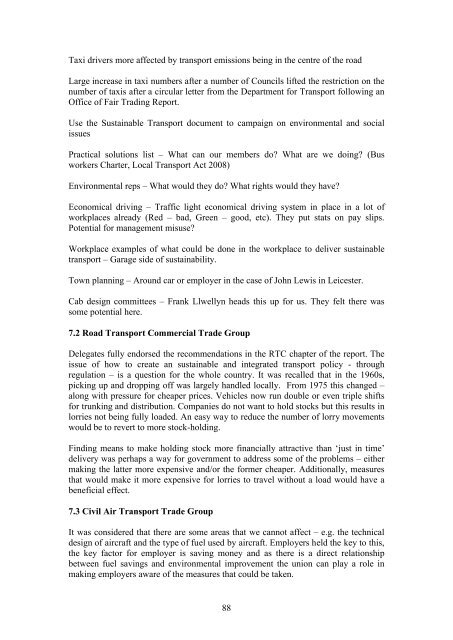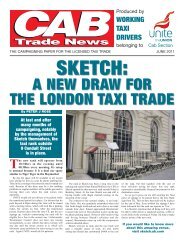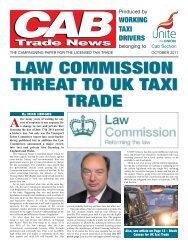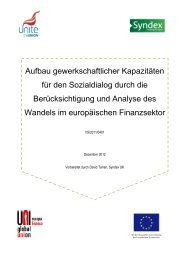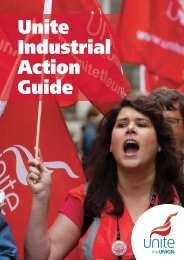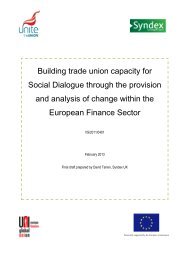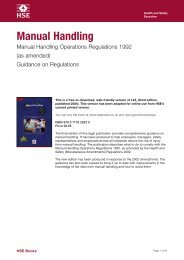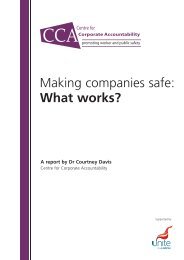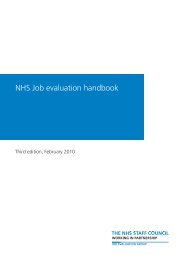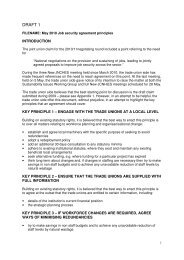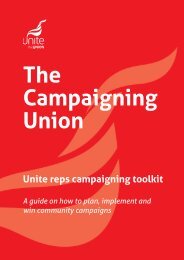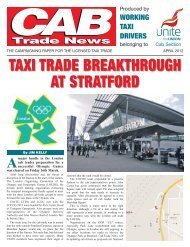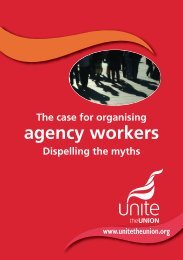Sustainable Transport and the Environment Guide - Unite the Union
Sustainable Transport and the Environment Guide - Unite the Union
Sustainable Transport and the Environment Guide - Unite the Union
You also want an ePaper? Increase the reach of your titles
YUMPU automatically turns print PDFs into web optimized ePapers that Google loves.
Taxi drivers more affected by transport emissions being in <strong>the</strong> centre of <strong>the</strong> road<br />
Large increase in taxi numbers after a number of Councils lifted <strong>the</strong> restriction on <strong>the</strong><br />
number of taxis after a circular letter from <strong>the</strong> Department for <strong>Transport</strong> following an<br />
Office of Fair Trading Report.<br />
Use <strong>the</strong> <strong>Sustainable</strong> <strong>Transport</strong> document to campaign on environmental <strong>and</strong> social<br />
issues<br />
Practical solutions list – What can our members do? What are we doing? (Bus<br />
workers Charter, Local <strong>Transport</strong> Act 2008)<br />
<strong>Environment</strong>al reps – What would <strong>the</strong>y do? What rights would <strong>the</strong>y have?<br />
Economical driving – Traffic light economical driving system in place in a lot of<br />
workplaces already (Red – bad, Green – good, etc). They put stats on pay slips.<br />
Potential for management misuse?<br />
Workplace examples of what could be done in <strong>the</strong> workplace to deliver sustainable<br />
transport – Garage side of sustainability.<br />
Town planning – Around car or employer in <strong>the</strong> case of John Lewis in Leicester.<br />
Cab design committees – Frank Llwellyn heads this up for us. They felt <strong>the</strong>re was<br />
some potential here.<br />
7.2 Road <strong>Transport</strong> Commercial Trade Group<br />
Delegates fully endorsed <strong>the</strong> recommendations in <strong>the</strong> RTC chapter of <strong>the</strong> report. The<br />
issue of how to create an sustainable <strong>and</strong> integrated transport policy - through<br />
regulation – is a question for <strong>the</strong> whole country. It was recalled that in <strong>the</strong> 1960s,<br />
picking up <strong>and</strong> dropping off was largely h<strong>and</strong>led locally. From 1975 this changed –<br />
along with pressure for cheaper prices. Vehicles now run double or even triple shifts<br />
for trunking <strong>and</strong> distribution. Companies do not want to hold stocks but this results in<br />
lorries not being fully loaded. An easy way to reduce <strong>the</strong> number of lorry movements<br />
would be to revert to more stock-holding.<br />
Finding means to make holding stock more financially attractive than ‘just in time’<br />
delivery was perhaps a way for government to address some of <strong>the</strong> problems – ei<strong>the</strong>r<br />
making <strong>the</strong> latter more expensive <strong>and</strong>/or <strong>the</strong> former cheaper. Additionally, measures<br />
that would make it more expensive for lorries to travel without a load would have a<br />
beneficial effect.<br />
7.3 Civil Air <strong>Transport</strong> Trade Group<br />
It was considered that <strong>the</strong>re are some areas that we cannot affect – e.g. <strong>the</strong> technical<br />
design of aircraft <strong>and</strong> <strong>the</strong> type of fuel used by aircraft. Employers held <strong>the</strong> key to this,<br />
<strong>the</strong> key factor for employer is saving money <strong>and</strong> as <strong>the</strong>re is a direct relationship<br />
between fuel savings <strong>and</strong> environmental improvement <strong>the</strong> union can play a role in<br />
making employers aware of <strong>the</strong> measures that could be taken.<br />
88


